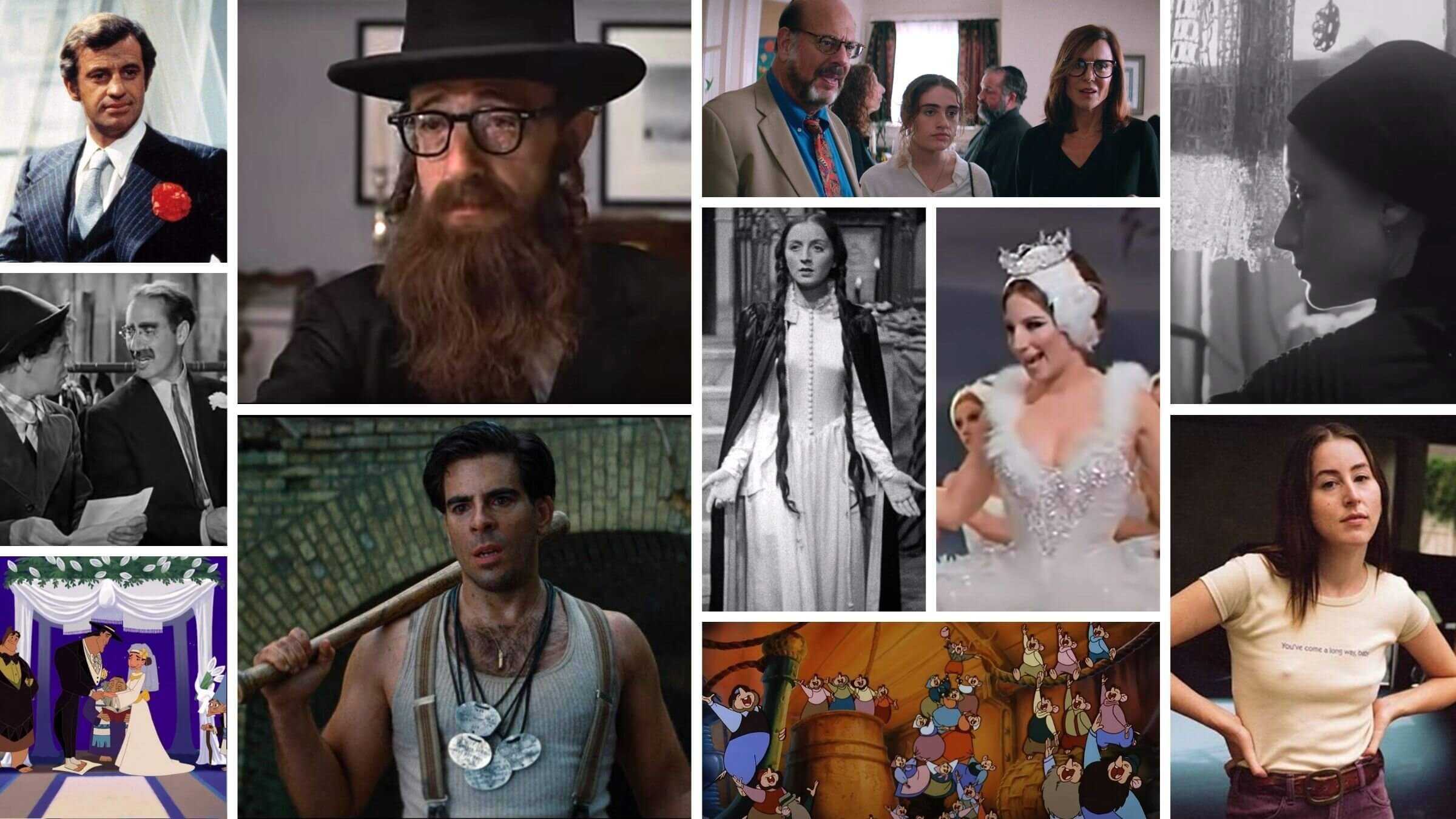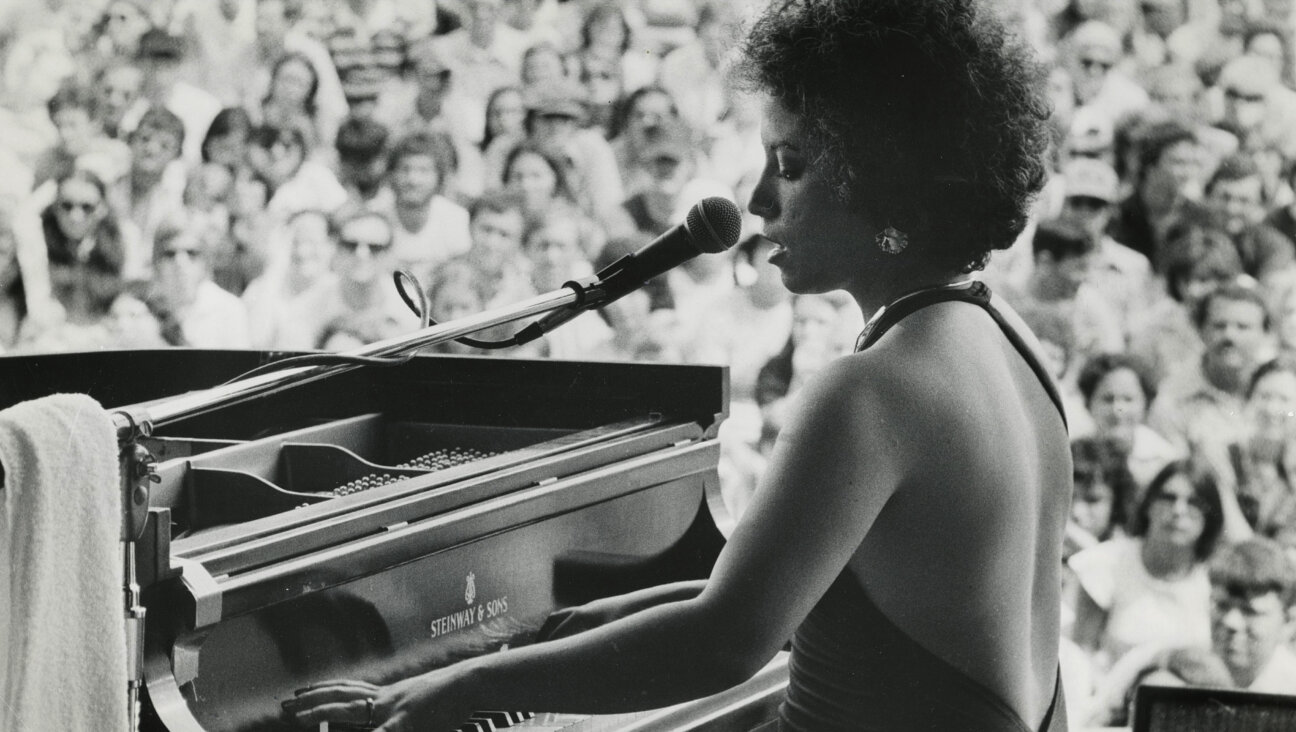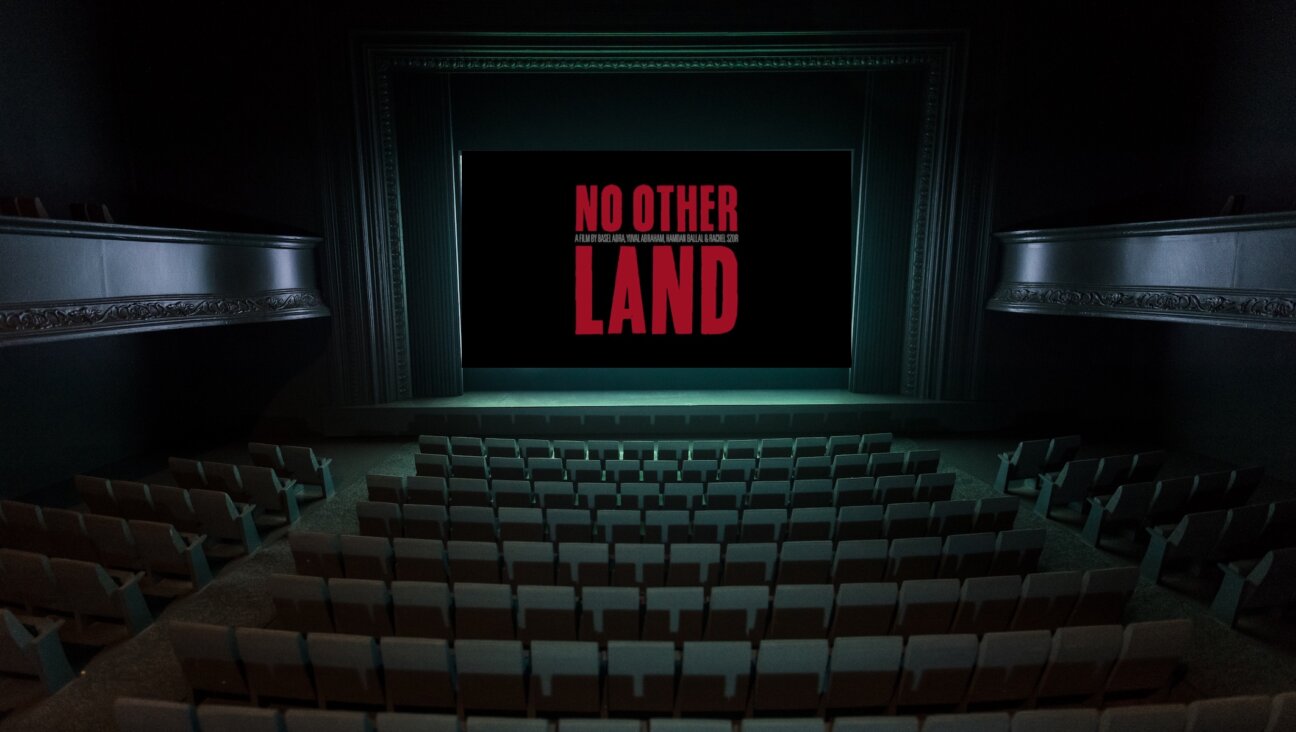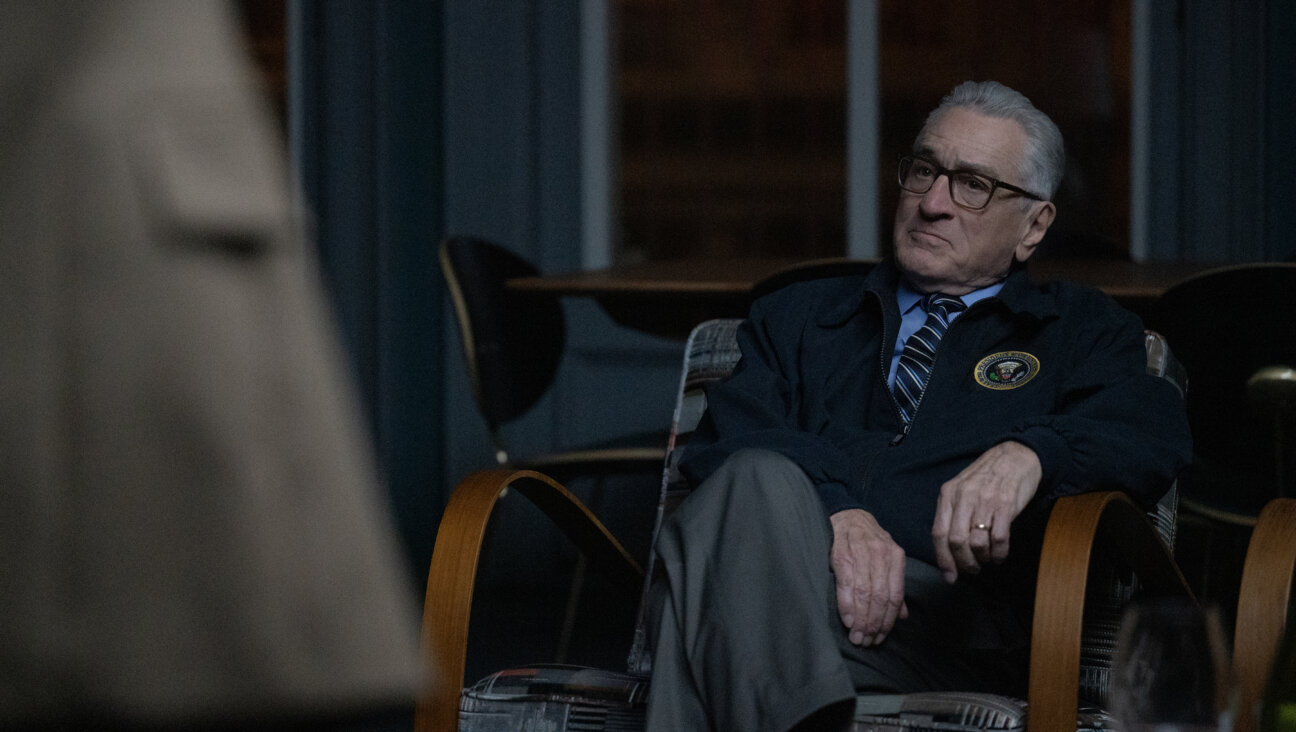The 125 greatest Jewish movie scenes of all time (51-75)
In which Mel Brooks changes history, Tarantino creates a Jewish legend and Elaine May gets her day

Scenes from “Inglorious Basterds,” “Funny Girl” and “Der Dybbuk” capture a Jewish je ne sais quoi. Photo by Angelie Zaslavsky
51. Goodfellas (1990) – “He’s not Jewish! Do you know how these people live?”
“Goodfellas” is about a Sicilian crime family, but the main character is half-Irish and marries a Jewish woman, Karen Friedman (Lorraine Bracco). The Friedmans aren’t the Meyer Lansky Murder, Inc. type of Jew; these are run-of-the-mill Long Island Jews. The contrast between the Jewish mother and Italian gangster husband is illustrated in this scene where Karen’s mother is aghast that her son-in-law routinely stays out all night. “Your father never stayed out all night without calling,” she yells. “Stay out?” Karen cries. “Dad never went out at all!” (AS)
52. The Great Advisor (1940) – Mahjong ladies get the better of a huckster radio host
Based on the real-life Yiddish radio personality C. Israel Lutsky, the self-styled “Yiddisher Filosof,” this film devastatingly lampoons the host’s long-running advice show through the conduit of the great comic Irving Jacobson. Jacobson plays the “Great Advisor” as a fumfering, self-aggrandizing huckster who appeals to his listeners to send him their problems. Taking him up on his offer, a group of scoffing young mahjong-playing women concoct a hilariously convoluted “problem” for him to solve, which, in the great tradition of Yiddish middlebrow entertainment, works out for everyone in the end. The film was directed by Joseph Seiden, whose father ran one of New York’s first movie nickelodeons, from which Joseph grew a vest pocket production company for low-budget Yiddish and African American films. (HS)
53. The Great Dictator (1940) – The Tramp’s final speech
In his pre-1940 films, Charlie Chaplin had not spoken a single word (though he did sing a bit in “Modern Times”). He saved his words for one of the most powerful speeches recorded on film, the last minutes of “The Great Dictator.” Playing both a Hitleresque dictator named Hynkel and a Jewish barber who resembles him, Chaplin concludes his film with the barber mounting a podium to make a plea for peace and understanding. “Let us fight to free the world,” he shouts as he becomes both awestruck and frightened by his ability to hypnotize the masses and bend them to his will. (AL)
54. Hannah and Her Sisters (1986) – Mickey chooses life
Unable to have biological children, Mickey (Woody Allen), a TV writer, and Hannah (Mia Farrow) divorce, leading to Mickey’s ultimate crisis of faith. He briefly embraces Catholicism and Buddhism, then contemplates suicide. Walking through Central Park with Hannah’s sister Holly (Dianne Wiest), he explains how he pressed a rifle to his head but then thought “what if I’m wrong? What if there is a God.” After a sweaty misfire, he goes outside to get some air, wandering the Upper West Side and taking in a movie. Spoiler: The Marx Brothers make life worth living – it’s not all a drag. (CR)
55. Harold and Maude (1971) – Maude’s tattoo
Harold and Maude were made for each other. He drives a hearse. She steals cars. They both like going to strangers’ funerals. Through their love, they affirm one another’s lives – even as she dies. In a remarkable scene, the audience and Harold are made privy to why Maude so values life and honors death. As they hold hands, we see Maude’s tattoo and learn she is a survivor. It’s a poignant moment in a macabre cult classic – though it makes Maude’s choice to reside in a decommissioned train car more than a bit disquieting.
56. The Heartbreak Kid (1972) -The “deceitful cauliflower” scene
A half-decade before “Annie Hall,” Elaine May, working from a Neil Simon script, captured all the stranger-at-a-strange-dinner-table anxiety of being the only Jew in your significant other’s extremely non-Jewish house. Artificially grinning and making feeble attempts at conversation while being alternately condescended to and scowled at by Cybill Shepherd’s mom and dad, Charles Grodin needs no beard or black hat to show what it is that separates Lenny Cantrow from the Corcorans. (AL)
57. The Hebrew Hammer (2003) – “Shabbat Shalom, motherf—ers”
The Hebrew Hammer enters the batwing doors of a saloon as a needle scratches. There’s a Nazi flag on the wall, a bartender with a swastika shirt, a poster advertising a “Gestapo Pool Party” – the works. “Manischewitz, straight up,” he tells the bartender. These people don’t offer him much in the way of hospitality, but will give him one drink before they “lynch” him. Soon our 100% kosher avenger is smashing the bottle (from the year 5733) over the head of the barkeep. He twirls around to face the camera, pistols drawn, and crows a now iconic Shabbat greeting before dispensing his brand of whoop-ass. Jewsploitation at its finest.
58. Hester Street (1975) -The cost of American assimilation
In Joan Micklin Silver’s film, Yankel, now calling himself Jake (Steven Keats), is in love with an Americanized Polish-Jewish dancer. His Orthodox, sheitel-sporting, Yiddish-speaking wife, Gitl (Carol Kane), who had just emigrated from Russia, turns him off. In the film’s most unsettling scenes, Gitl reshapes her body with a corset, donning a beautiful dress, makeup and, most transformative, curling her real hair. She wants to re-attract Jake by being who she is not—and to that extent, she’s demeaning herself. But at the same time she’s establishing her independence and American identity. In a towering rage, Jake physically assaults Gitl, pulling at her real hair as if he were ripping off a wig. His violence is self-directed too. He hates what he has become and he can no longer love Gitl either. The chasm between Old World and New World is unbridgeable. (SH)
59. The History of the World: Part I (1981) -The Spanish Inquisition
Mel Brooks’ primer on world history begins with Orson Welles’ narration of the horrors of the Spanish Inquisition and the introduction of Grand Inquisitor Torquemada (“You can’t Torquemada anything!”). This weighty introduction turns into a musical number with jokes about Jews getting pokers in their asses, their testicles being played like ping-pong balls and a Catherine Wheel torture device reimagined as a slot machine – only to morph into a Busby Berkeley-esque swim number with nuns emerging from the pool on a giant menorah. Not sold yet? The song is also really, really catchy. (JK)
60. The House I Live In (1945) – Sinatra teaches children the folly of antisemitism
Taking its name from a song with lyrics by Abel Meeropol (who also wrote “Strange Fruit” and would later adopt the Rosenbergs’ children) and music by Earl Robinson (who would later be blacklisted), this short was produced explicitly to confront antisemitism toward the end of a war that revealed its deadly consequences. In it, Frank Sinatra – playing himself – defends a child being chased by 10 other kids (one in a Jughead hat) for being Jewish. “You must be a bunch of those Nazi werewolves I’ve been reading about,” Ol’ Blue Eyes says. For about eight minutes Sinatra dishes out some real talk, exposing how silly this prejudice is while pumping up American exceptionalism, wartime prowess and diversity as strength. He also immediately loses some moral authority in hindsight by referring to the Japanese by what we now universally recognize as a slur. Meeropol was reportedly unhappy with the film, which elided a lyric to his song that mentioned “my neighbors white and Black,” thus stripping it of a more universal antiracist message, but it remains a bizarre and entertaining artifact – and hopefully saved some Jewish kids from getting pelted with pennies.
61. Ida (2013) – Ida meets her aunt – and uncovers Poland’s past
At a convent in Poland’s countryside in 1962 the Mother Superior advises Ida, a novitiate raised there since she was orphaned during World War II, that she must meet her only living relative before taking her final vows. Enter Aunt Wanda who tells the aspiring nun that she was born Ida Lebenstein; that like her aunt, her parents were Jewish; and that they died during World War II under mysterious circumstances. The angelic novitiate and her hard-drinking, promiscuous, onetime judge of an aunt embark on a road trip to uncover that mystery. Their journey involves literally and figuratively excavating the past to find how and why their common Jewish roots intertwine with those of Polish Catholics. (CR)
62. Inglorious Basterds (2009) – “The Bear Jew”
Likening Jews to animals is typically something Nazis do, but somehow Quentin Tarantino was able to turn the awful trope into a point of pride. In an indelible scene, Eli Roth’s Sgt. Donny Donowitz, aka “The Bear Jew,” appears from beneath an aqueduct, like a beast from the colosseum pit, to interrogate a captured Nazi. We hear him before we see him, striking at his enclosure, the sound drawing nearer as the camera pulls in on the now-scared Naz and on the source of the clamor. Finally Donowitz appears from the passage, garlanded with medals, a Louisville Slugger slung over his shoulder. He prods an Iron Cross on his quarry’s chest: “You get that for killing Jews?” You know what happens next. “Bear Jew” entered the lexicon, even becoming the moniker of onetime Chicago Bears tackle Gabe Carimi.
63. Ishtar (1987) – The right way to say “schmuck.”
Though much of Jewish history and practice is readily available online, some aspects of the culture are fundamentally unteachable — such as the proper pronunciation of the word “schmuck.” This universal truth is best exemplified in a delightful throwaway scene in Elaine May’s “Ishtar,” in which the improbable lothario Dustin Hoffman consoles his heartsick songwriting buddy Warren Beatty who squanders an impromptu Yiddish lesson. (AL)
64. The Jazz Singer (1927) – “You ain’t heard nothin’ yet!”
The first audible line of the first talking movie — and it’s Jewish. With a Jewish creative team fronted by star Al Jolson, “The Jazz Singer” takes on a classic tale of a second-generation Jewish immigrant pulled between tradition and assimilation. In a version of his own life story, Jolson plays Jakie Rabinowitz, the son of a cantor who must choose between the Broadway stage and the East Side bimah. While early scenes of Jakie’s childhood show his parents fretting in silent film title cards, the rift between generations and custom is manifested through the technical marvel of sound, with the adult Jakie (now Jack Robin) singing for jazz club patrons. The film’s reputation has been tarnished by Jolson’s use of blackface, but the moment audiences heard this first line spoken in this scene, a new era of movies was born. (AS)
65. The Jazz Singer (1980) – Neil Diamond sings Kol Nidre
After abandoning his synagogue for a career in the music business, former cantor Jess Robin (Neil Diamond) returns on Yom Kippur to sing Kol Nidre in place of his ailing father. The services are followed by a meeting between the estranged father and son, which moves from tense standoff to joyful embrace when Jess reveals that he now has a son of his own. Between Diamond’s devout delivery of Kol Nidre and the tear-inducing reunion, it makes for a surprisingly affecting conclusion to a film that has veered wildly from campy to dull to deeply cringeworthy — though no amount of feel-good plot resolutions can redeem Diamond’s earlier blackface scene. (DE)
66. Jewish Luck (1925) – Mendel’s Dream
Shloime Mikhoels, the glorious Yiddish actor and tragic martyr, plays Sholom Aleichem’s luckless matchmaker, Menachem Mendel. In a disturbingly prescient dream sequence, he loads Jewish women into a cattle car. (HS)
67. Kentucky Fried Movie (1977) – Trailer for “Cleopatra Schwartz”
The all-Jewish writing team of Zucker/Abrahams/Zucker, who went on to “Airplane” and “Naked Gun” fame, had its humble beginnings in this way-out-there sketch comedy movie featuring outrageous parodies of pop culture including this faux-movie trailer. Picture doppelgangers for a gun-toting 1970s Pam Grier and a schlubby 1970s Woody Allen in a torrid 1970s=style cheesy action-vigilante-romance-blaxploitation with a touch-of-Talmud film and you’ve got “Cleopatra Schwartz.” Tagline: “While she burned the ghetto to the ground, he lit the sabbath candles.” (GR)
68. Kronk’s New Groove (2005) – Kronk’s Jewish wedding
Of course Disney would bury its Jewish representation in a direct-to-video release. That doesn’t mean it doesn’t matter. Kronk, the lovable henchman from “The Emperor’s New Groove,” is shown under a huppah – married by a rebbe – and held aloft on a chair both in a dream sequence and in the end credits, a confirmed Incan-Peruvian Jew. He may be Disney’s main Jewish icon, cropping up in their Rosh Hashanah social media posts. How you like them apples (and honey)?
69. Licorice Pizza (2021) – “Very fashionable”
According to the casting agent in Paul Thomas Anderson’s ode to his 1970s California childhood, a “Jewish nose” is a fashionable asset for aspiring actresses. In fact, she tells Alana (Alana Haim), the film’s irritable and adrift protagonist, that she’s been getting a lot of requests for Jewish girls. (Thank you, Babs!) Yes, there’s some light antisemitism — the agent refers to Krav Maga as “Quick Draw McGraw” and dismisses Hebrew as a viable language — but it’s all part of the biz. Despite Alana’s extensive (and completely fabricated) resume, there’s just something special about that Jewish schnoz of hers. (JZ)
70. Listen Up Philip (2014) – Roth achieves misanthropic divinity
There’s humor, there’s black humor (which some people say is just Jewish humor), and then there’s the final scene of “Listen Up Philip,” in which the most deliciously nasty novelist in cinematic history succeeds in alienating everyone who once loved him to the point where he achieves a kind of divinity. He staggers to his ex-girlfriend’s apartment, gets wanly rebuffed, and staggers back into the cold Brooklyn night as the narrator’s voice — which might very well be the voice in his own head — explains that he’ll never, ever be happy again. Philip Roth, the spiritual father of “Listen Up Philip,” gave up writing novels two years before the film came out. I don’t know if he ever watched it, but if he had, he might have been pleased to see that his brand of comedy wasn’t just alive but thriving. (JA)
71. The Mad Adventures of Rabbi Jacob (1973) – Impersonating the Rebbe
Buoyed by a memorably madcap performance from French comic Louis de Funes, this slapstick caper about a bigot named Victor Pivert who goes on the lam, disguising himself as the titular rabbi, improbably became one of the biggest international hits of the 1970s. In this early scene, Pivert manages to dupe everyone in the Marais district, passing plausibly as a Jew since he responds to their questions in true rabbinical fashion with yet more questions. (AL)
72. The Man in the Glass Booth (1975) – “Am I Jewish?”
Undoubtedly the most powerful Jewish speech ever written by a carousing English actor and delivered by an Austrian actor. Wracked with guilt, a Jewish Holocaust survivor, played by Maximilian Schell, takes on the identity of a notorious Nazi, seeking both to punish himself and educate the world about how a murderous fascist ideology managed to captivate the German people. Railing against his accusers in an Eichmann-esque glass booth and mocking those who claim he’s actually Jewish, Schell delivers the Robert Shaw-penned script with a ferocity that could trigger nightmares. Shaw wrote only one speech that was more memorable than this one, but it has a lot more to do with sharks than the Jewish people. (AL)
73. Monty Python’s Life of Brian (1979) – Judean People’s Front v. People’s Front of Judea
This movie tracks the life of Brian (hence the title), a baby born in the manger next to the Christ child who gets mistaken for a savior. In an era where the Romans really were the bad guys, Brian gains his own unwanted followers, and the Pythons send up the very core of religious zealotry. Included in the story of Jesus’ well-known fate (spoiler alert) is a behind-the-scenes clash of Jewish activists who treat each other with disdain, though they are working for the same anti-Roman cause. “The only people we hate more than the Romans are the Judean People’s Front… and the Judean Popular People’s Front” – so says The People’s Front of Judea. It rings so familiar, it makes you wonder if the Pythons ever sat in on town halls for Jewish communal orgs. (GR)
74. Lost In America (1985) – The “Nest Egg Principle”
There’s a meme that goes: “Tell me you’re (something) without telling me you’re (something)”. That might apply here to Albert Brooks’ David Howard, who berates his wife Linda (Julie Hagerty) simply because she gambled away their entire life savings just as they were looking to drop out of society. This famous scene has him explaining the concept of money, saving and God. Really, could it be more Jewish without saying it’s Jewish? (GR)
75. Love at First Bite (1979) -Van Helsing pulls out a Star of David
During a tense standoff at a fancy restaurant, Dr. Jeff Rosenberg (who has changed his surname from Van Helsing “for professional reasons”) tries using a crucifix to ward off Count Dracula’s amorous advances towards his sometime-girlfriend Cindy. “Well, Count—what do you say to that?” he says, raising his hand triumphantly, before realizing that he’s pulled out a Star of David by mistake. “I would say leave Cindy alone,” mocks the Count, “and find yourself a nice Jewish girl!” (DE)
























